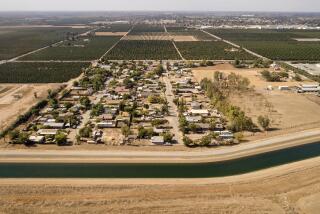More Precious Than Oil : Syria’s boycott of water talks is misconceived
- Share via
It may be months before anything comes of the Middle East peace conference that began in Madrid this week. It could take even longer to deal with an issue as divisive as nearly any in the Middle East: water.
If Syrian President Hafez Assad has his way, he will delay water talks until the prospects for peace look better. If only because his own water situation is nearing crisis, he should think again.
Water is far more precious than oil in most of the region of pale deserts. For no one is that truer than for the 20 million people of Israel, Syria and Jordan, where nearly every drop of available water is spoken for.
Along the West Bank, for example, the concept of land for peace might easily mean water for peace. An aquifer under land that Israelis captured during the 1967 War supplies perhaps 40% of all of Israel’s potable water. But nobody knows for certain where the aquifer lies or how much of the water would be transferred out of the country if the land changed hands.
One prediction is that shortages could be so severe in Syria, Jordan and Israel by 1995 that the countries would be driven either to war or to negotiations to figure out how to divide water supplies.
Washington’s Center for Strategic and International Studies says that the crisis surely would reach that stage before the end of the century.
Turkey, whose snowcapped mountains make it the only country in the Middle East with surplus water, suggests a regional water distribution network to link countries so tightly that none would think of invading another for fear of rupturing the system.
Before the Madrid meeting was put together, there was talk of a meeting in Turkey to discuss that and other ideas, a meeting Syria said it would boycott if Israel was invited.
Hardly a harbinger of quick peace.
More to Read
Sign up for Essential California
The most important California stories and recommendations in your inbox every morning.
You may occasionally receive promotional content from the Los Angeles Times.










